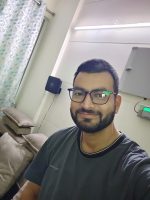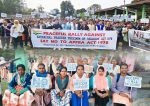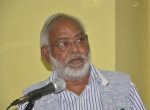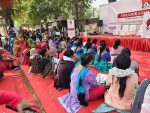By Deepika Singh
Mumbai, March 17, 2020: In 2004, an NGO requested me to share my experience of “climate change impact” on the “arid ecosystem” and my mind quickly switched to my homeland Ajmer, Rajasthan, a state in northern India.
Even though I was out of the village after completing my primary education, I had opportunities to go back home for holidays and other occasions which helped me connect with that “reality” concretely.
It was not difficult for me to share as the childhood memories that were fresh in my mind. The village ponds used to overflow, natural streams gushed down from the “Nagpahad” (the local mountain) right up to February-March, kids went fishing in the streams and many other things. Long rainy days used to scare me and one day I knelt and prayed for rains to stop.
The situation has drastically changed over the years. Forget the water in the streams, all wells in the village are dry. There is no water for drinking, cultivation or for cattle. The mountain looked naked with no trees. Huge trees that once covered the village have all disappeared.
This made me think deeply about what was before, what is now and how things changed. Even the people have changed drastically. Their attitude towards natural resources too have undergone drastic changes.
Families now compete with each other to dig individual bore well. Deforestation is devastating, especially the mountain that once housed leopards, jackals, foxes and other wild animals.
My preparation for “sharing” of the “impact of climate change” made me reflect deep about all this and seek ways to educate youth, faith communities and the public about nature preservation. It also made me learn listening to the “mother planet.”
All this makes my heart burns within me. Why do humans set to destroy themselves?
The climate crisis and drastic natural resource depletion, loss of biodiversity have driven villagers to cities where slums have mushroomed. Many people now live on roadsides (climate refugees).
The reflection whelped me realize that humans have failed the “mother earth.” Mother Planet is like our bank account. We have to keep depositing money regularly if we have to withdraw from the account. When it comes to “nature” we only withdraw huge amounts without depositing.
Climate scientists speak of paying attention to the 1.5 degrees reversing.
In 2018 we were at a consultation at Pune and some renowned scientists associated with the Intergovernmental Panel on Climate Change (IPCC) stated that the damage done to planet was beyond repair. The Green House Gasses released in the atmosphere is heating the planet that cannot be reversed, not even with politically agreed 1.5/2 degree reversal.
Whenever I attend such a conference and listen to highly expert discourses, I struggle to understand why such knowledge does not reach the masses. If people will understand these facts, surely some changes will take place.
I am neither a science student nor an expert but an activist. I always believe that if you want any change to happen, you have to work for a “change of mindset”—yours as well as society. Since you have to begin somewhere just grab whatever the opportunity you get.
From 2008, I was invited to work as a visiting faculty to St. Andrews College of Arts, Science and Commerce, Mumbai, to design and implement the “Social Out Reach” program for the second year Bachelor of Arts and second-year Bachelor of Commerce students (about 500 of them). It was the most fertile land I ever had. I loved designing short programs engaging the college youth.
In 2010, I signed the St Francis Pledge – Catholic Climate Covenant to care for creation.
Under the aegis of Green audit of Campuses (education/religious and other) we as a team have conducted 14 green audits including nature walks and interreligious–personal reflection and tree plantation through college youth (We have planted 124 trees).
The internships and social outreach include engaging students with a classroom session on climate change sessions, solid waste management, family carbon calculation, short exposures on efficient solid waste management, and survey on solid waste management practices in slums-housing societies, a workshop on plastic pollution and poster exhibition on ‘Laudato Si’ (Pope Francis’ second encyclical focusing on the care of ecology) by college youth.
In 2014, the Bombay Archdiocese Office for Environment was established. It was God’s greatest gift. In 2016, I was appointed to work with the Climate Change Desk (CCD) of the Federation of Asian Bishops’ Conferences (FABC).
Working on Climate Change/Environment is not my “Job” but I would like to call it a journey with “mother planet” and in the process.
I have enjoyed designing and implementing several programs that include seminars, conferences and projects/activities—be it as AOE, CCD or with college youth. Some interesting seminars and workshops were the Maharashtra conference on ‘Laudato Si’ and the Christian Business, and the Asian level conference on Business Sector Response to ‘Laudato Si.’
The future programs are environment and youth: personal reflection and promotion/protection of green cover, biodiversity registry/ensuring protection of biodiversity at the local level, desertification.
Just a word on COVID 19.
The news flashes every hour speaking of massive economic losses, and closure of malls, hotels closed and cinema halls. It also calls for self-quarantine. Is it not a call of “mother planet” to leave her alone, as we have plundered her resources too much? We have trampled on her beyond her ability to bear. She is now demanding her “me” time, her own space, healing and recouping time. She asks humans to learn the skills to return “home” to good healthy eating and living.
Humans need to learn to appreciate, honor and care for the “holy spirit” the “prana” the “breath,” the fresh air, the purest gift from nature.
(Deepika Singh is the project coordinator, Federation of Asian Bishops’ Conferences: Office of Human Development and Climate Change Desk; and secretary: Mumbai Archdiocese Office for Environment, Mumbai.)










